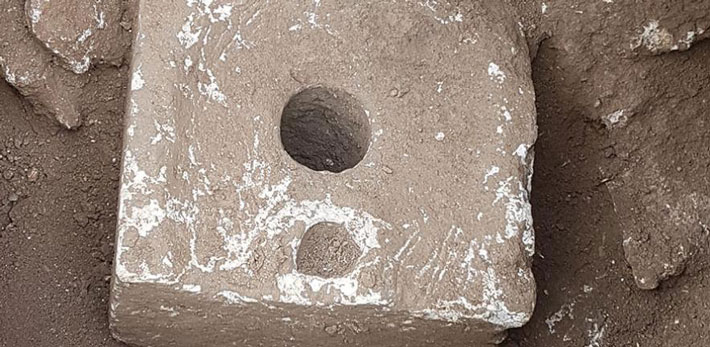 CAMBRIDGE, ENGLAND—According to a statement released by the University of Cambridge, traces of the single-cell parasite Giardia duodenalis have been detected in the soils associated with two 2,600-year-old toilets made up of stone seats situated over cesspits that were found at what were the homes of wealthy people in Jerusalem. Giardia can cause diarrhea, cramps, fever, and death. Initial microscopic examination of the soil taken from the toilets identified the presence of roundworm and other possible intestinal parasites. Piers Mitchell of the University of Cambridge and his colleagues continued the search for evidence of parasites in the ancient feces through the use of a biomolecular technique called “ELISA,” which uses antibodies to detect the presence of single-celled organisms. “Unlike the eggs of other intestinal parasites, the protozoa that cause dysentery are fragile and extremely hard to detect in ancient samples through microscopes without using antibodies,” explained team member Tianyi Wang. Because Giardia spreads via contaminated water and sometimes by flies, Mitchell concluded that it was probably widespread throughout the ancient city. Read the original scholarly article about this research in Parasitology. To read about the origins of another parasite that has plagued humans for millennia, go to "Dawn of a Disease."
CAMBRIDGE, ENGLAND—According to a statement released by the University of Cambridge, traces of the single-cell parasite Giardia duodenalis have been detected in the soils associated with two 2,600-year-old toilets made up of stone seats situated over cesspits that were found at what were the homes of wealthy people in Jerusalem. Giardia can cause diarrhea, cramps, fever, and death. Initial microscopic examination of the soil taken from the toilets identified the presence of roundworm and other possible intestinal parasites. Piers Mitchell of the University of Cambridge and his colleagues continued the search for evidence of parasites in the ancient feces through the use of a biomolecular technique called “ELISA,” which uses antibodies to detect the presence of single-celled organisms. “Unlike the eggs of other intestinal parasites, the protozoa that cause dysentery are fragile and extremely hard to detect in ancient samples through microscopes without using antibodies,” explained team member Tianyi Wang. Because Giardia spreads via contaminated water and sometimes by flies, Mitchell concluded that it was probably widespread throughout the ancient city. Read the original scholarly article about this research in Parasitology. To read about the origins of another parasite that has plagued humans for millennia, go to "Dawn of a Disease."
Single-Celled Parasites Identified in Jerusalem’s Ancient Toilets
